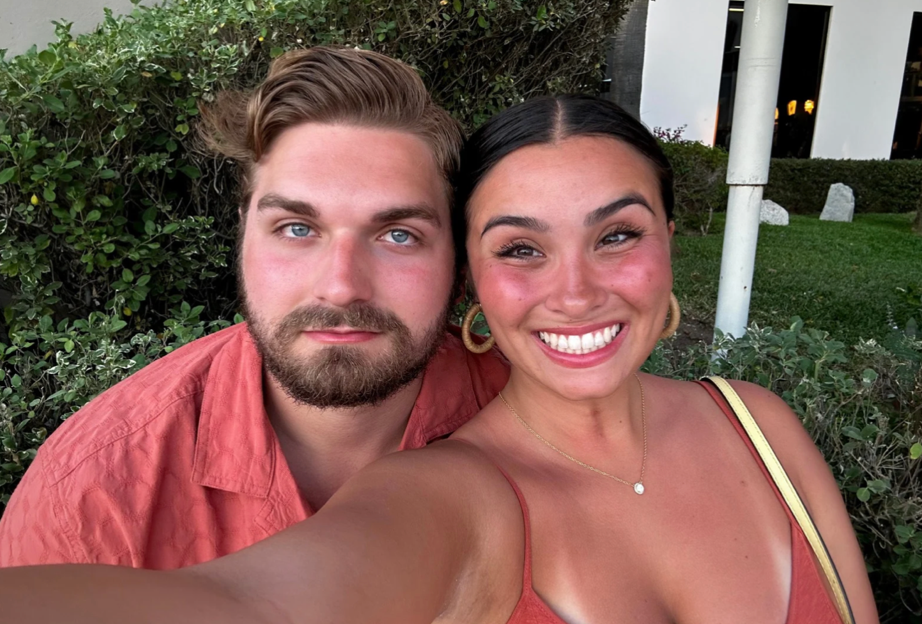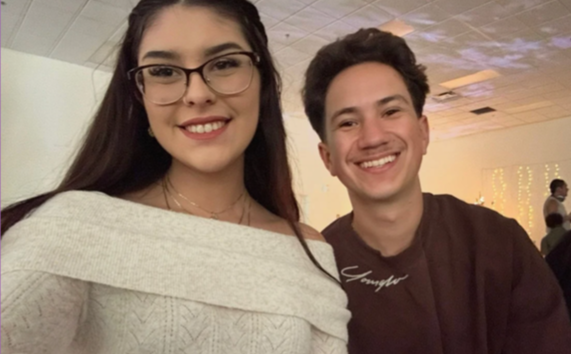
It’s Complicated. Or is it? An Inside Look to Dating in Your 20’s
Dating can be a fun experience or an incredibly awkward and painful one. If you start adding factors like dating apps, social media, finances and careers, it becomes more complicated.
The complexities of dating life might not be for everyone, but especially for today’s young adults. As a 22 year old myself, I can confidently say that I have been told more times than I can count that I should be enjoying my roaring twenties without the stress of being “tied down.” However, I have been happily “tied down” to my boyfriend for almost six and a half years. We started dating in high school, have never once broken up and still refer to ourselves as each other’s best friend. I knew high school sweethearts were uncommon and often face multiple odds to stay together, but I did not realize that our entire age bracket, or Generation Z, also faced the same stigma.
A survey conducted in 2023 by the Survey Center on American Life called Generation Z and the Transformation of American Adolescence: How Gen Z’s Formative Experiences Shape Its Politics, Priorities, and Future found that 56 percent of Gen Z adults were involved in romantic relationships during their teenage years. Dating in previous generations was much more common than today. The Baby Boomers and Generation Xers said in the survey that not only did they date in their youth, but some, if not most, found their lifetime partner in their teens or early adult lives.
A study from Child Trends titled Trends in Relationship Formation and Stability in the United States: Dating, Cohabitation, Marriage, and Divorce found similar results of a decline in the love department of people’s lives. The marriage rate has declined by roughly 60 percent over a 40-year-period. Additionally, the marriage age is being pushed farther back than seen previously, with men waiting until they are 30 years old and women waiting until they are 28 to marry. The study also found a rise in couples cohabiting rather than being married, but said cohabitation resulted in the couple separating within roughly five years in couples that formed anywhere from 2006 to 2013.
So why is there a sudden romantic decline? Why are couples struggling to make it work? Is the saying, “It’s not you, it’s me,” actually true, or are people simply not prioritizing romantic relationships over other aspects in their life? Surely my boyfriend and I are not alone in our romantic bubble while my fellow young adults would rather live their single life?
Love: For better or worse?
I spoke with two licensed marriage and family therapists to get to the bottom of why young couples are struggling to make their relationship last more so than previous generations.
Elizabeth James has been in practice as an L.M.F.T for 21 years, and in those years has met with couples of all ages. She credits her passion for wanting to heal relationships, marriages, and families to her own family dynamic from childhood.
“I grew up fascinated with the world of psychology,” James said. “I really appreciated and admired the intentional work that a marriage and family therapist does because they look at the whole system, not just an individual. We're not just helping the two people in front of us… (but) their family system. We're helping their ability to function as a member within the multiple layers of their life.”
James works with married and cohabiting couples, with her clientele ranging from mid or late twenties to mid sixties. Despite the large range of clients, she said the most common issue that couples face is a seemingly simple one: lack of communication between partners. Such a seemingly fixable issue is often what could break up a couple. Alongside communication issues is the lingering temptation of infidelity.
The fact is, monogamy and commitment are not so popular anymore in relationships. According to ScienceDaily, young adults are likely to consider more diverse relationship structures instead of typical monogamy. Young adults tend to shy away from being so-called “exclusive” with a partner, let alone in a long term relationship.
When asked why cheating has become a common issue in today’s relationships, James alluded to the amount of accessibility couples have thanks to the internet. With a significant increase in porn addictions, as well as the use of dating apps and social media, it is unfortunately easier than ever, so to speak, for someone to emotionally and/or physically betray their partner. Addiction Help.com found in January that approximately 69 percent of American men and 40 percent of American women view online porn each year. Additionally, 11 percent of men and three percent of women become addicted to porn. According to a Pew Research Center study in 2024, 30 percent of Americans used a dating site or app. Last July, Psychology Today found that social media addiction and social media-related infidelity can be linked, with men found more likely to cheat on their partners on social media than women.
“I think there's just a lot of stress and a lot of pressure,” James said when asked what could make a partner cheat. “We all feel it. Like in your workforce, there's less help and more (expectations) on the people that are working. So it's like we're all working like three or four different jobs at one place…then we bring that home. (Couples are) really not able to separate home from work. And then just the management of life, I think. All these factors can lead to infidelity.”
Ryan Bohm, another licensed marriage and family therapist who has been serving in a clinical role for five years, specializes in helping couples overcome trauma that they may bring unknowingly into their relationship from past life experiences. He said that in most commons, lack of communication is a byproduct of a deeper issue.
“Often there is previous trauma that is inhibiting the couple from connecting and feeling safe with each other,” Bohm said.
Bohm said he often starts working with assisting couples with processing their attachment issues from early life or family experiences, since that is where trauma can be most significant.
“Can we honor the fact that it happened?” Bohm posed the question when asked about his therapeutic approach when working with couples’ trauma. “Can we honor that (it) existed? And (then) we start to make meaning through the pain.”
I asked Bohm to break down the issue of cheating, to which he explained that most partners do not even realize they are doing it until it is too late.
“It's this very gradual, confusing process for a lot of people,” he said. “We kind of start to trust someone… we depend on them and be vulnerable with them. We become intimate with them, and then it leads into what we define as infidelity, whether emotional or physical.”
In terms of working through that kind of betrayal, therapy can only take someone so far. Bohm and James agreed that they can only guide a couple so far, but it is ultimately up to them to put in the time and the effort to try to move on, if that is their choice. As the saying goes, “You can lead a horse to water, but you can’t make them drink it.”
Diving into couples’ love lives:
While infidelity, lack of communication and past trauma can be huge make-or-breaks for relationships, they are not a reason to give up hope that romance is alive and flourishing in a time where it does not seem like it.

My high school sweetheart and me: Taylor and Bradley
As I mentioned before, my boyfriend, Bradley Stripling, and I are an exception to the rule that first love does not last. Here we are, six years and counting, each serving as each other’s first love.
If someone had told me I would have met my person at 16 years old, I would have laughed and asked if you had the right person. I had no plans to date seriously so early in life, neither did Bradley. It just happened. One year of building a friendship will do that to some people. That and what I call fate.
I say fate because what else could it be on the day we met. I was celebrating my 16th birthday at Huntington Beach at Tower 13 with some friends when Bradley happened to be hanging out with his football teammates at, you guessed it, Tower 13. He turned my birthday into a teenage dream, and the rest has been history.
That being said, it has not always been easy. We each were each other’s first serious romantic partner. We had to learn on the job. We had no true prior experiences, unless you consider a childhood crush experience. Our biggest issue is not lack of communication, but how we communicate. One of us responds more with emotion while the other responds with logic. It can be frustrating, and often seems like such an easy time to give up on the emotional toll a relationship can have, which I am now sure is one of the leading causes of breakups. It can be so easy to decide not to invest the effort it takes to stay in a relationship. Our secret to staying together is patience, mostly on Bradley’s end since I’m an emotional person, to say the least.
While it is not easy, it is so rewarding. We watched each other grow into the people that we are today. Everyday, we continue to grow together as individuals and in our relationship. Everyday I discover something new about Bradley for me to fall in love with. Most of all, I know he is not only my best friend, but he is most definitely my person.
Our timeline is not the most typical. Most couples would be engaged or married after being together for almost seven years, but most couples did not start dating as young as we did, or are more financially established than we are. While we know we want to get married someday, we have had to accept that day is not today, not until we feel that we can afford a place of our own comfortably.
Financial strain is also one of the leading causes of breakups. A study conducted by Qualtrics on behalf of Intuit Credit Karma found that more than 38 percent of Gen Z and 36 percent of millennials said that they would break up with their partner if they did not share the same money values as them.
Bradley and I are both 22 years old, still getting our careers started and have accepted that our timeline will look different from anyone else’s, which is okay. One thing I have learned while being in a relationship is never to compare my own to someone else’s, but to be thankful that I am happy with the person I am with and the relationship we built together

He was her best friend… until he wasn’t: Sarah and Bryan
Sarah Ortiz, 24 and Bryan Solana, 21, did not meet each other in the most ideal way. Both were working at In-and-Out and met during a lunch break in 2021. Ortiz was involved in a long term relationship with her boyfriend from high school.
“I was very shy,” Solana said. “I used to be like 300-and-something pounds… I was a little insecure at first… I (saw) Sarah and was like, ‘Oh, she’s cute.’ But I never thought anything would ever happen at all.”
Solana said he was immediately attracted to her, but knew he had to be respectful of her relationship at the time. Little did he know that Ortiz and her boyfriend’s relationship was heading downhill when she met Solana.
Ortiz admitted to having an attraction to Solana while with her ex-boyfriend, but turned those feelings of attraction into a fondness for a friend, even after she and her previous partner broke up, which led to Solana being stuck in the friendzone for about four years. It did not help that both of them tried seeing other people while denying the underlying attraction in their friendship.
“There was something there, something about him,” Ortiz said. “And so I would try to prolong our time spent together. I would offer him rides after work.”
Meanwhile, Solana was courting Ortiz without her realizing – taking her on snowboarding dates and out to nice dinners without her realizing that he was trying to turn their friendship into something more.
Things finally changed between them on Ortiz’ 23rd birthday. After a night of clubbing in West Hollywood, they were the last two remaining of their friend group. Ortiz found herself laying her head in Solana’s lap, gazing up at him, when suddenly it all clicked into place for her.
“I told him, ‘I love you,’” she said. “He asked, ‘Are you for real?’ I said, ‘Yes.’ Then he said it back to me.”
The next morning they went to brunch expecting it to be awkward, but it was already easy after being friends for so long.
Many couples find that a strong friendship can be a great foundation for a relationship. A study published in 2021 by the journal Social Psychology and Personality Science called The Friends-to-Lovers Pathway to Romance: Prevalent, Preferred, and Overlooked by Science found that nearly 70 percent of relationships start out as friendships. Who knows? The one might be closer than you think.
While Ortiz and Solana have only been in a relationship for a year and a half, they said their trick to making it work is being open to communication and learning to adapt to how your partner communicates.
“There's definitely times where you're not going to want to communicate or you're going to want to stay with your anger,” Ortiz said. “But it’s important to keep love at the center of it because it could so easily get tainted by anger. (You) definitely have to keep that person's heart at the center of it, value them as a person and give as much love as you can.

From teen romance to wedding bells: Amber & DeAngelo
Amber Flores, 23, started dating her husband, DeAngelo Flores, 23, five years ago and married him last year. Like Bradley and myself, their timeline would not be considered traditional.
“I know this is crazy, but (after) like six months of us dating, we moved in with his parents,” Amber said. “In the beginning, I just saw it as more of a whatever happens, happens kind of situation. (Getting serious with DeAngelo) wasn't anything I thought of until it progressed further and we moved in. And that's when things got way more serious.”
Moving in together at 18 years old is not conventional, but it allowed Amber and DeAngelo to strengthen their relationship during his transition into the military. Flores said they wanted to spend as much time together as possible, so naturally that was the best step for them as a couple.
According to the National Survey of Family Growth, couples aged 25 to 34 are more likely to cohabitate. Women in that age group are also more likely to get married after cohabitation. However, as I have said before, everyone has a different timeline.
For this couple, their complications are not centered between themselves, but an outside factor – Amber’s in-laws.
“Something (will come) up again, disregarding me, my feelings, my boundaries, then I'm back to being like, hey, like I don't have a voice here clearly,” Amber said. “So I (tell DeAngelo), ‘I need you to speak for me in this situation. I am your wife and I do want you to defend me.’”
It comes down to what Bohm advised during my discussion with him; To make sure you make sure that your partner feels seen and heard. Luckily, Amber said DeAngelo does his best to make sure his wife’s feelings are validated while still keeping things peaceful with his parents.
DeAngelo leaving for six months for training was another strenuous time for the couple. Their communication was limited to letters and 10 minute phone calls. Amber said she missed him so much that she adopted a cat to keep herself company.
“When I first showed him the cat on his last week in training when he got his phone back and we could speak for almost an hour…, I showed him the cat and he was getting teary eyed. We wanted to adopt a cat together, but I did it without him because I missed him.”
Amber made it up to him by adopting a second fur baby after he returned home.
Along with adopting two cats, Amber said some of her favorite memories with DeAngelo have been watching him build relationships with her family. She said being family oriented is essential to her, and is thankful that her husband shares the same values.
Yet another great piece of advice from another couple; Make sure your morals align, and if they do not, talk about it. Speaking from personal experience, it is always best to communicate your morals, goals and boundaries openly with your partner, even if they continue to evolve down the road
So how do we make relationships work?
Now that couples have shared their love stories and licensed professionals have shared some key reasons why relationships struggle, let’s recap on how to help a relationship flourish.
Amber said to never settle in a relationship because there can always be room for improvements. Ortiz and Solana said always hold love in your heart for your partner, even when times get tough. Bohm and James say communication is the key. My own last piece of advice would be to enjoy the present with your partner because someday, it will be the memories you two look back on together. I think that is as cheesy as I can get.
If you find yourself struggling with your relationship for any reason, Bohm and James invite you to schedule a session with either, or both of them. You can schedule a session with James at her website or by calling (626) 593-6306. You can also schedule an appointment with Bohm through his website or by calling (626) 600-0594.
Taylor Moore can be reached at bytaylor.moore@gmail.com.
0 Comments Add a Comment?